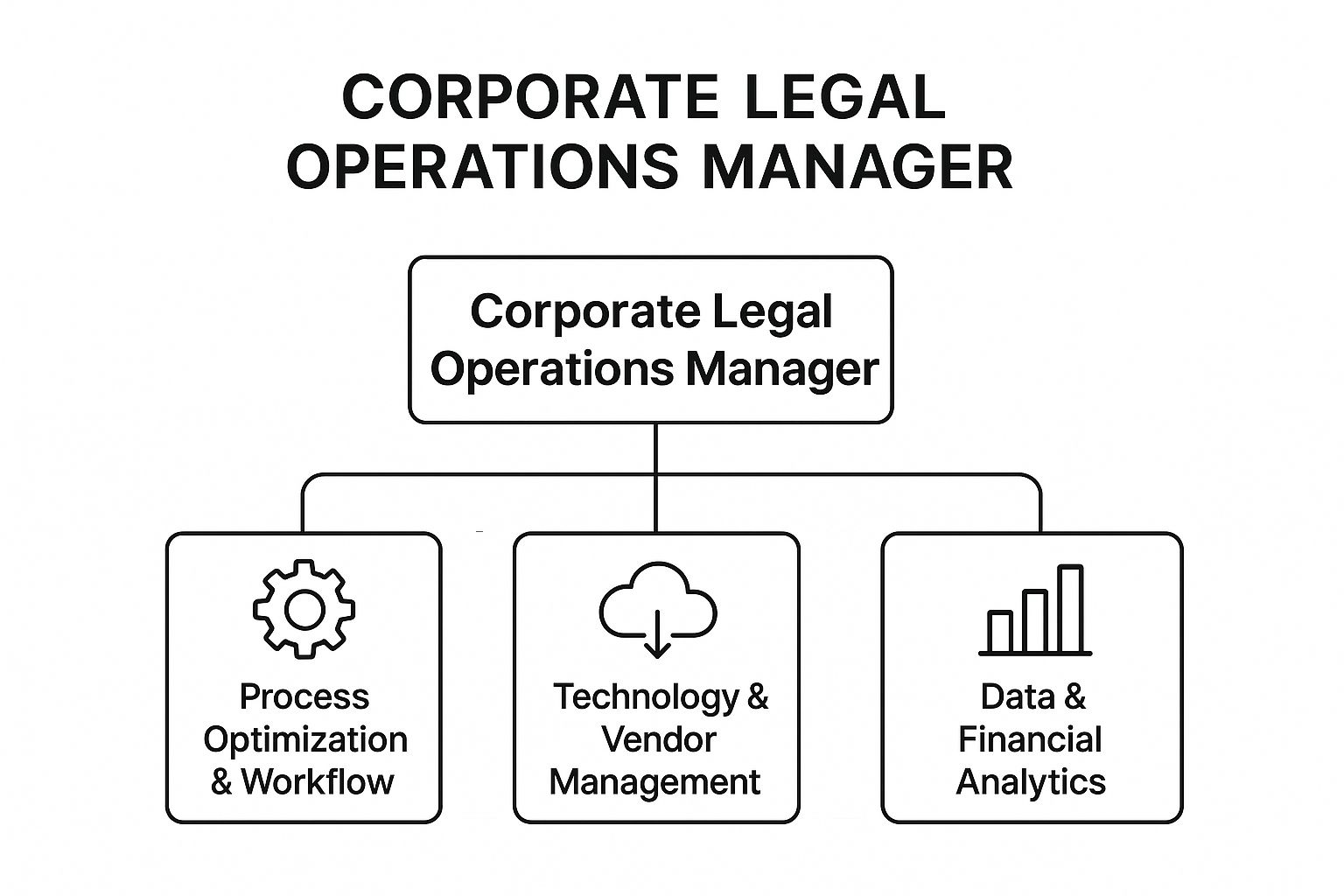
 20 minutes read
20 minutes read
Let’s be real. You didn’t survive three years of law school and the bar exam just to spend your life in a document review dungeon, fueled by lukewarm coffee and the quiet hum of a dying fluorescent light. The endless cycle of tracking your life in six-minute increments grinds you down. You start wondering if there's more to this legal career thing than just… this.
Turns out, there is. The legal world is exploding with roles that demand your sharp analytical mind, your knack for navigating complex rules, and your J.D., but don't require you to bill a single, soul-crushing hour. These aren't just side-gigs; they're high-impact careers at the intersection of law, technology, and business. We’re talking about shaping the future of legal services, not just billing for them. Think of it as leaving the gladiator pit for a seat in the architect's studio.
This guide isn't a fluffy list of generic career advice. I'm diving into the alternative attorney jobs that are actually worth your time, from becoming a Legal Tech Consultant to a Legal Product Manager. We’ll break down what you actually do, the skills you need to land them, and what the future looks like. Ready to see what’s out there? Let’s find a career that won't make you mortgage your soul for a partnership track.
Tired of watching your firm drown in spreadsheets and clunky software from the early 2000s? A legal tech consultant is one of the most impactful alternative attorney jobs because you become the hero who drags law practices into the current century. You're not just tech support; you're a strategist who gets the unique agony of legal workflows and can translate that into a streamlined, tech-powered operation.
This role is for the attorney who always tinkered with case management settings or built a better document automation flow "just for fun." You'll bridge the massive gap between lawyers and software developers, making sure the solutions actually solve problems instead of creating new ones.

Think of yourself as a translator and a problem-solver. A firm wants to slash the time attorneys spend on contract review. You’re the one who vets, recommends, and implements an AI-powered contract analysis tool—and you do it without the transition descending into total chaos.
Here’s the real talk:
This isn't about picking shiny new software. It's about understanding the core business and legal needs and then finding the right tech to serve them—a skill surprisingly rare in both legal and tech.

The Insider Edge: Your value isn't just knowing the tech; it's knowing the lawyers. You can anticipate their resistance, understand their ethical concerns, and speak their language in a way a pure-IT consultant simply can't.
Pivoting into this career means deliberately mashing up your legal skills with new technical chops.
Are you the one who actually reads the terms and conditions? Do you enjoy finding the loopholes in complex regulatory frameworks? Being a Compliance Officer is one of the most stable alternative attorney jobs because you're the company’s guardian, steering it away from crippling fines and PR disasters. You're not just a rule-enforcer; you're a strategic advisor who knows that staying on the right side of the law is a competitive advantage.
This role is for the attorney who has a knack for risk assessment and a talent for making complicated rules understandable to people who think "tort" is a type of cake. You'll bridge the perilous gap between ambitious business goals and the ever-growing web of regulations, ensuring the company can innovate without self-destructing.
Think of yourself as an internal detective and a proactive guide. Your company wants to launch a new fintech product, but it falls under a dozen different financial regulations. You are the one who builds the compliance framework from the ground up, trains the product team on what they can and can’t do, and makes sure every "t" is crossed.
Here's the real talk:
This isn’t about just saying "no." It's about finding the "how"—how to hit business goals while respecting the legal and ethical lines that can't be crossed.

The Insider Edge: Your value is your ability to translate legalese into practical business action. You’re not just reciting regulations; you’re embedding them into the company's DNA, making compliance a reflex, not an afterthought.
Shifting into compliance means leveraging your legal background while building specialized regulatory knowledge. You can find more information about the role by checking out this guide on legal careers that don't always require a law degree on hireparalegals.com.
Do you find yourself explaining complex court rulings to friends and family, and secretly enjoying it? If you'd rather dissect a Supreme Court brief than draft one, a career as a legal journalist might be one of the most fulfilling alternative attorney jobs out there. You get to stay immersed in the high-stakes drama of the justice system, without the billable hours.
This path is for the lawyer with a knack for storytelling and a low tolerance for legalese. You’ll translate the often-impenetrable language of law into compelling narratives that inform everyone from seasoned GCs to the general public. You are the bridge between the courtroom and the common reader.
Think of yourself as a legal analyst with a byline. Instead of arguing a case, you're explaining its significance to a broad audience. Your work isn't just reporting verdicts; it's uncovering the story behind the law.
Here's the real talk:
This isn't just summarizing court documents. It's about finding the human element, contextualizing legal shifts, and holding the powerful accountable—all with the credibility your J.D. provides.

The Insider Edge: Your legal training is your superpower. Unlike a traditional journalist, you can read a 100-page appellate opinion and instantly spot the one sentence that changes everything. You bring an insider’s perspective that can’t be faked.
Shifting from advocate to reporter requires you to build a new kind of reputation. It's less about your courtroom wins and more about your public voice.
Exhausted by the zero-sum game of litigation where the only real winners are the billable hours? Becoming a mediator or arbitrator is one of the most rewarding alternative attorney jobs because you shift from being a gladiator to a problem-solver. You use your legal knowledge to guide people toward resolution instead of escalating conflict.
This career path is for the lawyer who excels at finding the "win-win" and has the patience of a saint. You're not arguing a side; you're orchestrating a peace treaty or delivering a final, reasoned judgment, helping parties move on without the emotional and financial drain of a trial.

As a neutral, you're the calm in the storm. Mediators facilitate a structured negotiation, helping parties find common ground. Arbitrators act as private judges, hearing both sides and issuing a binding decision.
Here's the real talk:
You're not just splitting the difference. You're de-escalating emotions, clarifying complex legal points, and creatively structuring agreements a court might never be able to order.

The Insider Edge: Your credibility comes from your neutrality and expertise. Unlike a judge, you have more flexibility. Unlike an attorney, your only client is the resolution itself.
Transitioning from advocate to neutral requires building a reputation for impartiality. It’s a whole different game.
Ever feel like you have a better sense of where your colleagues should be working than they do? If you're the person everyone comes to for career advice and you love the thrill of making the perfect match, becoming a legal recruiter is one of the most rewarding alternative attorney jobs you can find. You’re not just filling seats; you're a career strategist, a market insider, and a dealmaker.
This role is for the attorney who genuinely enjoys networking and understands the subtle cultural differences between BigLaw, in-house, and government. You’ll leverage your background to connect talented professionals with opportunities they wouldn't find on their own, shaping careers and building elite legal teams.
Think of yourself as a high-stakes matchmaker. A law firm needs a partner with a portable book of business in IP, or a corporation wants to hire its first general counsel. You're the one who confidentially finds, vets, and presents the ideal candidates, managing the entire dance from first call to offer negotiation.
Here's the real talk:
This isn't just about spamming resumes. It's about understanding motivations, managing expectations, and navigating the delicate politics of high-level legal hiring.

The Insider Edge: Your J.D. isn't just a credential; it's your key to credibility. You understand the pressure of billables and the nuances of different practice areas, letting you connect with candidates and clients on a level a non-attorney recruiter simply can't.
Transitioning into recruiting means monetizing your network and your knowledge. It’s less about billable hours and more about building relationships.
Are you more fascinated by how legal work gets done than the work itself? If you're the lawyer who obsesses over budgets, streamlines workflows, and believes a legal department should run like a business, then legal operations is calling your name. This is one of the hottest alternative attorney jobs for those who blend legal acumen with a CEO's mindset.
Legal ops managers are the strategic backbone of corporate legal departments. You're not managing cases; you're managing the business of law. This role is for attorneys who see inefficiencies as puzzles to be solved and believe data, not just precedent, should drive legal strategy. You’re the bridge between the General Counsel and the CFO.
The infographic below outlines the core pillars of a Corporate Legal Operations Manager's responsibilities, showing how they integrate process, technology, and financial oversight.

This hierarchical structure shows that the role isn't just about one thing; it's about holistically managing the legal function's operational health.
Think of yourself as the Chief Operating Officer for the legal department. When the GC needs to cut outside counsel spend by 15% without sacrificing quality, you're the one who builds the data models, creates vendor scorecards, and implements a new billing review process to make it happen.
Here's the real talk:
You’re not just reacting to problems; you are proactively building the systems to prevent them, making the entire legal function more valuable.

The Insider Edge: Your legal training gives you the context to understand why processes are the way they are. Unlike a pure business analyst, you can identify operational improvements without compromising ethical duties or legal risk.
Shifting into legal ops requires you to flex your business and analytical skills as much as your legal ones.
Ever used a piece of legal software and thought, "This is infuriating. I could design this so much better"? Welcome to legal product management, one of the most creative and strategic alternative attorney jobs available. You’re not just advising on the law; you're building the tools that shape how law is practiced.
This role is for the attorney who sees systems and processes everywhere and can translate user frustrations into elegant solutions. You become the critical link between the engineers who build the product and the lawyers who will use it, ensuring the final product isn't just technologically impressive, but genuinely useful.
Think of yourself as the CEO of a specific product. You own the vision, strategy, and roadmap. You're the one interviewing overworked associates to figure out their biggest pain points, then translating those needs into a backlog of features for your engineering team to build.
Here's the real talk:
You're not coding, but you are immersed in the tech world, making high-stakes decisions that directly impact your company's bottom line and the daily lives of thousands of legal professionals.

The Insider Edge: Your legal background is your secret weapon. You can spot a fatal flaw in a proposed workflow that a non-lawyer PM would miss, and you can articulate the product's value to a skeptical legal audience with unmatched credibility.
Making this leap means adding a new skill set to your legal expertise. It’s about proving you can think like a business owner.
| Role | Implementation Complexity | Resource Requirements | Expected Outcomes | Ideal Use Cases | Key Advantages |
|---|---|---|---|---|---|
| Legal Technology Consultant | High – requires legal and technical expertise | Access to legal software, project management tools, vendor support | Streamlined operations, compliance, tech adoption | Law firms, legal departments adopting new tech | Bridges legal and tech, flexible work, high demand |
| Compliance Officer | Moderate to high – must understand complex regulations | Regulatory databases, training resources, audit tools | Regulatory adherence, risk mitigation | Finance, healthcare, tech, manufacturing | Job security, cross-industry roles, direct impact |
| Legal Journalist/Writer | Moderate – requires legal knowledge and strong writing | Research tools, media platforms, contacts | Informative, accessible legal content | Media outlets, legal publications, digital media | Creative outlet, flexible work, public influence |
| Mediator/Arbitrator | Moderate – requires specialized training and certification | Training programs, certification, client outreach | Dispute resolution, reduced litigation | Family law, commercial disputes, employment claims | Collaborative environment, flexible schedule |
| Legal Recruiter | Moderate – sales and relationship focused | Candidate databases, market research, networking | Successful placements, legal talent acquisition | Law firms, corporations, government agencies | High earning potential, extensive networking |
| Corporate Legal Operations Manager | High – combines legal, business, and tech skills | Analytics tools, legal tech platforms, vendor management | Efficient legal department operations | Corporate legal departments optimizing workflows | High growth, strategic impact, strong job security |
| Legal Product Manager | High – requires legal, product, and technical skills | User research tools, product management software, development teams | Market-ready legal tech products | Legal tech companies developing software products | High pay, equity, dynamic environment |
So, what’s the final judgment on your legal career? The evidence is clear: the traditional partner track is no longer the only path to a fulfilling and lucrative future. The days of being tethered to billable hours are over—unless that’s truly your jam. As we’ve seen, your Juris Doctor has unlocked a world of dynamic, impactful, and frankly, more interesting roles.
From the meticulous world of a Compliance Officer to the innovative sphere of a Legal Product Manager, your skills are in high demand. You are not just an attorney; you are a master of logic, a skilled negotiator, a strategic thinker, and a precise communicator. These are the pillars of success in any industry, not just a courtroom.
Pivoting from a traditional legal role to one of these alternative attorney jobs isn't just about updating your resume; it's a strategic move. It requires you to reframe your experience and see your J.D. as a versatile toolkit.
Here are your immediate next steps:
Ultimately, recognizing the value of your legal training beyond the courtroom is the most powerful move you can make. The world of alternative attorney jobs isn't a "backup plan"; it's a frontier of opportunity. Your degree isn’t a life sentence to one specific job description—it's a launchpad for wherever your ambition takes you.
Ready to build your new venture or streamline your legal department with expert support? HireParalegals connects you with top-tier, pre-vetted remote paralegals and legal assistants, so you can focus on innovation without the overhead. Find your perfect match and scale smarter by visiting HireParalegals today.